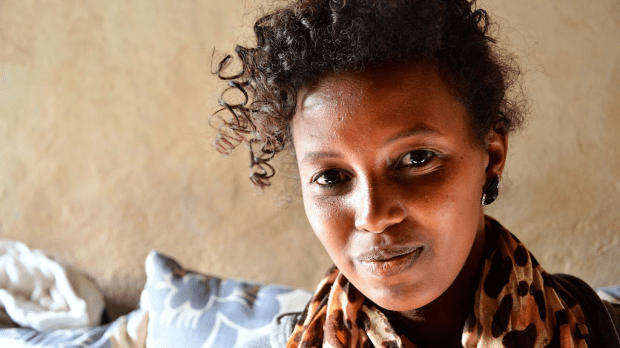Fatima was like many others in her village. The widow and mother of seven spent her days working tirelessly as a subsistence farmer doing monoculture cropping in the Oromia region of Ethiopia. But the recent and severe drought had made it impossible for her to feed her family. With one of the most vulnerable households in the community, Fatima became eligible to participate in a government assistance program and, along with the help of Catholic Relief Services (CRS), she set herself on a life-changing path.
Art Kirby — head of programs for CRS in Ethiopia — calls what Fatima has done since then extremely impressive. When he met her a couple of months ago he was amazed by what he saw.
“She now has a petty trading shop open for business, where people can buy household items like, soap, hygiene products, sweets, and various items not readily available in the village,” explains 40 year-old Kirby. “She also opened a small coffee shop area [the coffee ceremony and its role in Ethiopian culture is famous], and she rents out a donkey cart to local community members so they can bring products to and from market.”
Fatima also does bee keeping as well as “shoap” fattening, which involves buying sheep and goats, fattening them up for a few months, and selling them to vendors who deliver them to more urban areas for processing and sale.
“She has really embraced this idea of being an entrepreneur and learning financial literacy,” says Kirby. “She has taken the courageous step of going outside the comfort zone of what she was used to, recognizing that if she stayed in that one livelihood area, the future was bleak for her and her family.”
Fatima now sends her kids to school and has renovated her house. She put a new roof on and plastered her walls, which leads to better health outcomes for her children. “It was remarkable to see such a pristine compound, and within her one compound you could see 4-5 livelihood activities taking place at the same time,” says Kirby. “Despite all the hardships that have taken place over the past two years — multiple failed rainy seasons, the worst drought in 50 years — she has been able to maintain her household and really succeed.”
Fatima is a living reminder that necessity is often the mother of invention — and re-invention is what Ethiopians like Fatima must do in order to adapt and survive. Climate change is effecting farmers throughout the country; what they’ve known for generations is no longer working due to more frequent and intense droughts and challenging weather conditions.
Leveraging the indigenous knowledge of the community as well as introducing new techniques is one of the tasks of Kirby’s CRS team — although the majority of their work right now in the country is emergency food assistance. CRS is actually one of three pipelines of food assistance in Ethiopia, where over 10 million people are currently in need of food. “Our program specifically covers about a third of that, so we serve about 2.8 million people, who are currently getting food commodities every month to bridge the hunger gap from the drought.”
CRS is also involved in development-focused food security programs, which include agricultural activities and natural resource management. Part of that includes what CRS did for Fatima — helping people in small communities diversify their livelihood options and learn new skills to thrive long-term. This includes providing drought-resistant seeds, promoting intercropping and the diversification of crops, building area enclosures, and broadening options for making a living.
“More than 85% of the population in Ethiopia is dependent on rain-fed agriculture,” explains Kirby. “So with frequent and more intense droughts, households need other options to fall back on during difficult times.” CRS helps local people acquire business skills and learn to conduct simple market analysis in their communities to determine “entry points” for small enterprise, as well as put together business plans so local people can access credit from micro finance institutions or cooperatives.
CRS also has a program that encourages people to come together in self-selected groups — about 20-25 people — and pool their resources on a weekly basis, lend to each other, and pay back with some interest. “This establishes a culture of savings, which is often nonexistent in these communities and gives them basic financial services, like credit to invest in different income generating activities,” says Kirby. “It opens up more opportunities and as they grow in knowledge, prepares them to have access to financial services at a level they don’t currently have, as well as for more formal lending, which is often when you see more change happen.”
Fatima’s story is a good example of how people can take these basic steps. “Not everyone can be an early adopter,” says Kirby, “But when you have a positive role model and success story like that, it’s easier to replicate that.”
Kirby, who has been with CRS for 10 years and in Ethiopia for two, says what strikes him more than anything else when he visits local communities and individuals like Fatima is their resilience in the face of extremely difficult conditions. “The positive aspects of that resilience, too… I mean, there’s a recognition that times are tough, but the sense of community is very strong; they look out for each other. That kind of social capital is very impressive,” says Kirby. “And the faith they have in themselves and that things will be better I find quite striking in a country that faces as many challenges as Ethiopia does.”
Enjoy this story? You might also like:
What you’ve probably never heard about Gaza
The surprising inspiration one American aid worker found in Iraq

